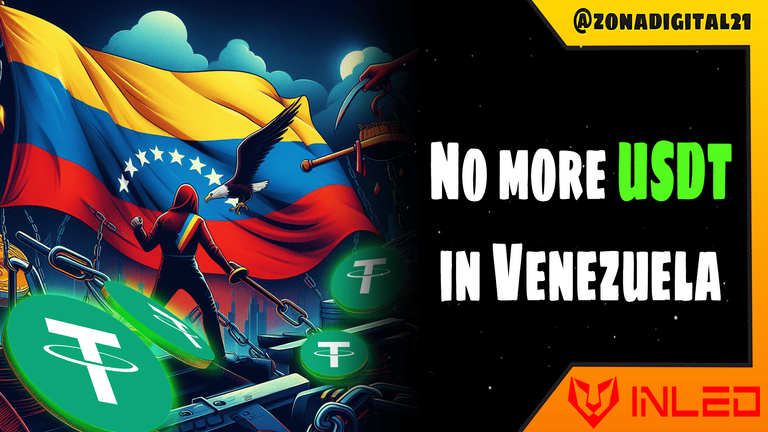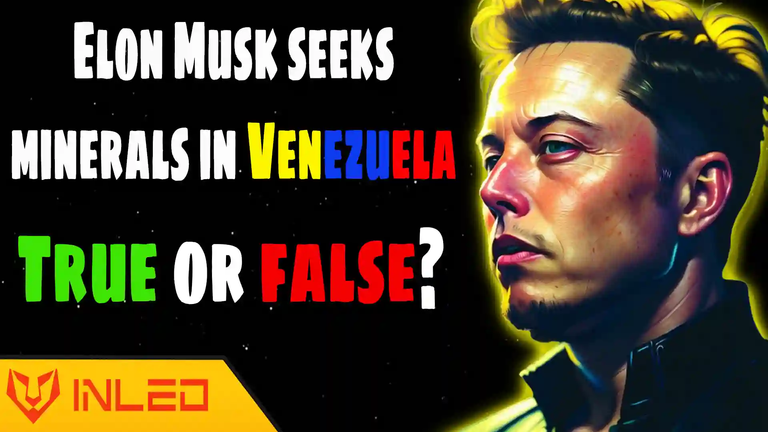USDT will no longer be accepted in VENEZUELA to trade Oil (New Sanctions)
I am not a passionate person or fanatic about politics, but I am passionate about crypto, and for that reason when I see an interesting news that links or is related to my country Venezuela and cryptocurrencies, I always try to cover it and share my opinión with you.
Today I want to talk to you about a news that has been on everyone's lips in my country, and the headline goes something like this: Tether would freeze assets if Venezuela resorts to cryptos to evade sanctions.
Will you tell me that it is not a striking headline to analyze, read everything, here I leave my point of view on the subject.

Image generated with Bing AI - Edited in Photoshop CC
Table of contents for this article:
♦️ What is going on?
♦️ What is the reason for this sanction?
♦️ Why is it important?
♦️ What does it mean for Venezuela?

What's going on?
Tether, the issuer of $USDT, has announced that it will block payments made to OFAC (Office of Foreign Assets Control) sanctioned entities after it was revealed that Venezuela's state-owned oil company PDVSA is increasingly using USDT. This news has caused quite a stir in the crypto community, I wouldn't say so much that it has caused a stir in many countries or sectors, as this actually affects only a limited group, even being a crypto issue, it is not something that affects the market in general, but it does affect Venezuela in particular.
And I say it affects us directly here in Venezuela, as we are in a country where cryptocurrencies have become an escape route from hyperinflation and economic sanctions.
A couple of days ago I shared a similar topic that was related to Venezuela, and I assure you that it was an interesting topic to analyze just as this one is.

You may be interested in: Headlines misinform people (Venezuela's natural resources)
This announcement of Tether is significant for several reasons, and here I will tell you some of them and the most interesting to analyze. First, this shows the power that cryptocurrencies have to circumvent economic sanctions, because cryptocurrencies, due to their decentralized nature, allow users to make transactions without the need of an intermediary, such as a bank, which could be subject to sanctions, and this is the case that applies to Venezuela, many of the international bank accounts have Venezuelan funds blocked due to sanctions, and it has to be admitted that this greatly harms our country.
But it is important to analyze the two sides of the same coin, because it is not only about the sanctions, it is understood that these sanctions have some reason behind them, so we can not blame the managers of Tether for this decision, and I will tell you why.
While cryptocurrencies can help countries circumvent sanctions, they can also be used by sanctioned entities to engage in illicit activities. That is why Tether has decided to freeze the assets of sanctioned entities, and PDVSA is one of those entities on the list, that is why this announcement was made recently, and although it is something that affects us, I fully understand that it is following the Crypto security protocol according to OFAC (Office of Foreign Assets Control).

Image generated with Bing AI - Edited in Photoshop CC
What is the reason for this sanction?
OFAC has issued general licenses authorizing some transactions and business with Venezuela. For example, in October 2023, OFAC issued a general license for six months, yes you read that right, only 6 months in which it temporarily authorized transactions related to the oil and gas sector in Venezuela.
Before that license it was not possible to make any type of trade related to this sector, now, this license has expired, and the 6 months we had to carry out these commercial activities have come to an end, and for that reason the OFAC has included PDVSA again in the list of not allowed entities, and the directors of Tether follow to the letter the OFAC list, that is where all this is related, do you understand everything?
The license would be renewed only if Venezuela complies with its commitments under the electoral roadmap and that is another issue that many are talking about recently as the Electoral issue is approaching for the country.

Image generated with Bing AI - Edited in Photoshop CC
Why is it important?
Now let's talk a little bit about Tether and my point of view, of course I will only speak from a neutral and very sincere point of view, which makes all the sense in the world, because that's how I understand this.
First, cryptocurrencies are being used in the real world, in this case, to facilitate oil exports. Second, it highlights the tension between the promise of cryptocurrencies to provide financial freedom and the reality that these can be controlled by centralized entities like Tether, for if this could not be controlled, then Venezuela's USDT funds would not have to suffer the block, such assets would be free for Venezuela's use, but we can already see that this is not the case, it would be interesting to see what your take on this is in the comments.

Image generated with Bing AI - Edited in Photoshop CC
What does it mean for Venezuela?
For us, Venezuelans, this news has profound implications. As I indicated at the beginning of this article, cryptocurrencies have been a lifeline in the midst of the economic crisis. They have allowed us to preserve the value of our money in the face of hyperinflation and to make international transactions despite the sanctions.
A clear example of all this is that the community that makes life in HIVE, a large partGoodthem are Venezuelan, and we use Cryptocurrencies as a good way to maintain the value of our capital.
However, Tether's decision to freeze assets shows that even in the crypto world, we are not completely free from the influence of external entities.
Many surely thought that the solution to this whole issue could only be to renew the OFAC license, but it is important to note that these licenses do not eliminate the sanctions, but rather provide temporary and limited relief from them. For a long-term solution, it would be necessary for Venezuela to comply with the commitments mentioned above and for significant political and economic changes to take place in the country. However, this is a complex issue involving multiple actors and factors, and there is no easy or quick solution.
You have reached the end of this article, now it is time for you to share your opinion in the comments, I am very grateful to you for taking the time to read my content, happy day to everyone ....


Follow me on Twitter.
English is not my native language, so I have used Hive Translator...
Posted Using InLeo Alpha
BTC can be volatil but is the best choice in long term. HBD isn't a option yet.
In Fiat why not start to accept payment in Yuan?
El Salvador is one of the Latin countries that adopted the $BTC as a legal currency for circulation and use in the country, but did you see the new news from El Salvador?
A hacker managed to disclose and breach the BTC wallet that El Salvador had, that is something worrying, but of course the $BTC is one of the best options.
The Yuan would certainly be another good option, but then Venezuela does not receive the YUAN as a payment method for the oil sold, there are so many things that are wrong here that the possible solutions that can be seen, has in the end something contraindicatory.
Thank you very much for leaving your comment, I really appreciate you taking the time to read the content.
!PIZZA
!PGM
$PIZZA slices delivered:
@zonadigital21(1/5) tipped @yecier